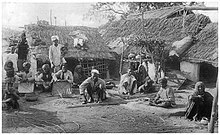 Global Information
Global InformationCaste information

| Part of a series on |
| Political and legal anthropology |
|---|
| Social and cultural anthropology |
| Part of a series on |
| Discrimination |
|---|
 |
A caste is a fixed social group into which an individual is born within a particular system of social stratification: a caste system. Within such a system, individuals are expected to: marry exclusively within the same caste (endogamy), follow lifestyles often linked to a particular occupation, hold a ritual status observed within a hierarchy, and interact with others based on cultural notions of exclusion, with certain castes considered as either more pure or more polluted than others.[1][2][3][4] Its paradigmatic ethnographic example is the division of India's Hindu society into rigid social groups. Its roots lie in South Asia's ancient history and it still exists.[1][5] However, the economic significance of the caste system in India has been declining as a result of urbanisation and affirmative action programs. A subject of much scholarship by sociologists and anthropologists, the Hindu caste system is sometimes used as an analogical basis for the study of caste-like social divisions existing outside Hinduism and India. In colonial Spanish America, mixed-race castas were a category within the Hispanic sector, but the social order was otherwise fluid.
The term "caste" is also applied to morphological groupings in eusocial insects such as ants, bees, and termites.[6]
- ^ a b
- Lagasse, Paul, ed. (2007), "Caste", The Columbia Encyclopedia, New York, NY: Columbia University Press, ISBN 978-0-231-14446-9, retrieved 24 September 2012 Quote: "caste [Port., casta=basket], ranked groups based on heredity within rigid systems of social stratification, especially those that constitute Hindu India. Some scholars deny that true caste systems are found outside India. The caste is a closed group whose members are severely restricted in their choice of occupation and degree of social participation. Marriage outside the caste is prohibited. Social status is determined by the caste of one's birth and may only rarely be transcended."
- Madan, T. N. (2012), caste, Encyclopæida Britannica Online Quote: "caste, any of the ranked, hereditary, endogamous social groups, often linked with occupation, that together constitute traditional societies in South Asia, particularly among Hindus in India. Although sometimes used to designate similar groups in other societies, the "caste system" is uniquely developed in Hindu societies."
- Gupta, Dipankar (2008), "Caste", in Schaefer, Richard T. (ed.), Encyclopedia of Race, Ethnicity, and Society, Thousand Oaks: SAGE, pp. 246–250, ISBN 978-1-4129-2694-2, retrieved 5 August 2012 Quote: "Caste: What makes Indian society unique is the phenomenon of caste. Economic, religious, and linguistic differentiations, even race-based discrimination, are known elsewhere, but nowhere else does one see caste but in India."
- Béteille 2002, pp. 136–137. Quote: "Caste: Caste has been described as the fundamental social institution of India. Sometimes the term is used metaphorically to refer to rigid social distinctions or extreme social exclusiveness wherever found, and some authorities have used the term 'colour-caste system' to describe the stratification based on race in the United States and elsewhere. But it is among the Hindus in India that we find the system in its most fully developed form although analogous forms exist among Muslims, Christians, Sikhs and other religious groups in South Asia. It is an ancient institution, having existed for at least 2,000 years among the Hindus who developed not only elaborate caste practices but also a complex theory to explain and justify those practices (Dumont 1970). The theory has now lost much of its force although many of the practices continue."
- Mitchell, Geoffrey Duncan (2006), "Castes (part of SOCIAL STRATIFICATION)", A New Dictionary of the Social Sciences, New Brunswick, NJ: Aldine Transaction Publishers, pp. 194–195, ISBN 978-0-202-30878-4, retrieved 10 August 2012 Quote:"Castes A pure caste system is rooted in the religious order and may be thought of as a hierarchy of hereditary, endogamous, occupational groups with positions fixed and mobility barred by ritual distances between each caste. Empirically, the classical Hindu system of India approximated most closely to pure caste. The system existed for some 3,000 years and continues today despite many attempts to get rid of some of its restrictions. It is essentially connected with Hinduism."
- "caste, n.", Oxford English Dictionary, Second edition; online version June 2012, Oxford, UK: Oxford University Press, 1989, retrieved 5 August 2019) Quote: "caste, n. 2a. spec. One of the several hereditary classes into which society in India has from time immemorial been divided; ... This is now the leading sense, which influences all others."
- ^ Scott & Marshall 2005, p. 66.
- ^ Winthrop 1991, pp. 27–30.
- ^ Kanti Ghosh, Sumit (18 May 2023). "Body, Dress, and Symbolic Capital: Multifaceted Presentation of PUGREE in Colonial Governance of British India". Textile: 1–32. doi:10.1080/14759756.2023.2208502. ISSN 1475-9756. S2CID 258804155.
- ^ Béteille 2002, p. 66.
- ^ Wilson, E. O. (1979). "The Evolution of Caste Systems in Social Insects". Proceedings of the American Philosophical Society. 123 (4): 204–210. JSTOR 986579.